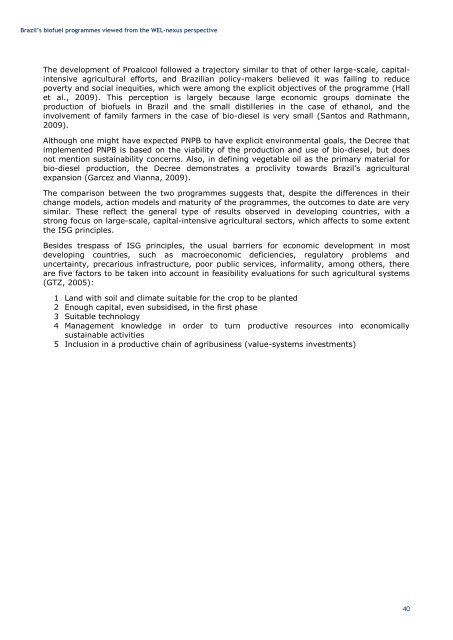Brazil’s biofuel programmes viewed <strong>from</strong> <strong>the</strong> <strong>WEL</strong>-nexus perspectiveThe development of Proalcool followed a trajectory similar to that of o<strong>the</strong>r large-scale, capitalintensiveagricultural efforts, and <strong>Brazilian</strong> policy-makers believed it was failing to reducepoverty and social inequities, which were among <strong>the</strong> explicit objectives of <strong>the</strong> programme (Hallet al., 2009). This perception is largely because large economic groups dominate <strong>the</strong>production of biofuels in Brazil and <strong>the</strong> small distilleries in <strong>the</strong> case of ethanol, and <strong>the</strong>involvement of family farmers in <strong>the</strong> case of bio-diesel is very small (Santos and Rathmann,2009).Although one might have expected PNPB to have explicit environmental goals, <strong>the</strong> Decree thatimplemented PNPB is based on <strong>the</strong> viability of <strong>the</strong> production and use of bio-diesel, but doesnot mention sustainability concerns. Also, in defining vegetable oil as <strong>the</strong> primary material forbio-diesel production, <strong>the</strong> Decree demonstrates a proclivity towards Brazil’s agriculturalexpansion (Garcez and Vianna, 2009).The comparison between <strong>the</strong> two programmes suggests that, despite <strong>the</strong> differences in <strong>the</strong>irchange models, action models and maturity of <strong>the</strong> programmes, <strong>the</strong> outcomes to date are verysimilar. These reflect <strong>the</strong> general type of results observed in developing countries, with astrong focus on large-scale, capital-intensive agricultural sectors, which affects to some extent<strong>the</strong> ISG principles.Besides trespass of ISG principles, <strong>the</strong> usual barriers for economic development in mostdeveloping countries, such as macroeconomic deficiencies, regulatory problems anduncertainty, precarious infrastructure, poor public services, informality, among o<strong>the</strong>rs, <strong>the</strong>reare five factors to be taken into account in feasibility evaluations for such agricultural systems(GTZ, 2005):1 Land with soil and climate suitable for <strong>the</strong> crop to be planted2 Enough capital, even subsidised, in <strong>the</strong> first phase3 Suitable technology4 Management knowledge in order to turn productive resources into economicallysustainable activities5 Inclusion in a productive chain of agribusiness (value-systems investments)40
Brazil’s biofuel programmes viewed <strong>from</strong> <strong>the</strong> <strong>WEL</strong>-nexus perspective6 Final considerationsAn analysis of <strong>the</strong> sustainability of <strong>the</strong> expansion of Brazil’s biofuel (ethanol and bio-diesel)production programmes requires an integrated evaluation of <strong>the</strong> water, energy and land-useaspects (Harmsen, 2011). The issue is to verify whe<strong>the</strong>r <strong>the</strong> sugar cane and soybean cropsystems confront limitations in creating a different and sustainable development path as <strong>the</strong>yexpand (BRASIL, 2011b) with respect to: (a) water availability and its consequences; (b) <strong>the</strong>impacts of <strong>the</strong> existence of economically viable land to be incorporated into <strong>the</strong> crop system;(c) <strong>the</strong> expansion of <strong>the</strong> rural workforce; and (d) energy efficiency in <strong>the</strong> biofuel productioncycle, as well as o<strong>the</strong>r environmental considerations.First, it was observed that in Brazil, <strong>the</strong> availability of agricultural land does not present alimitation to <strong>the</strong> expansion of <strong>the</strong> planned ethanol and bio-diesel production. Using <strong>the</strong> mainsugar cane and soybean-producing states as a proxy, namely SP and MT, <strong>the</strong> main limitationto incorporating land is not its physical existence but ra<strong>the</strong>r <strong>the</strong> impact of <strong>the</strong> increased costresulting <strong>from</strong> its appreciation, over time, on <strong>the</strong> profitability of <strong>the</strong> crops, and consequently onfinal prices for ethanol and bio-diesel.Moreover, a second-order effect of <strong>the</strong> impact of <strong>the</strong> increased cost of land is <strong>the</strong> use ofmarginal lands (pasture and rough land). These areas require more use of agricultural inputs(fertilisers, correctives, herbicides, among o<strong>the</strong>rs) per hectare cultivated, which areresponsible for significant environmental impacts.In <strong>the</strong> case of ethanol, <strong>the</strong> sharp fall in <strong>the</strong> profitability of <strong>the</strong> business explains why <strong>the</strong>industry is increasingly focused on producing sugar, to <strong>the</strong> detriment to ethanol; this ispushing up <strong>the</strong> price charged by <strong>the</strong> plants to fuel distributors in Brazil. In this context, <strong>the</strong>industry argues for <strong>the</strong> export of ethanol (UNICA, 2011b); but despite such public statements,its strategy is to obtain more profit than <strong>the</strong> domestic market offers. On <strong>the</strong> o<strong>the</strong>r hand, on 17August 2011, <strong>the</strong> government obtained approval in <strong>the</strong> Chamber of Deputies of ProvisionalMeasure 532/11, which, among o<strong>the</strong>r provisions, reduces <strong>the</strong> mandatory percentage for <strong>the</strong>addition of anhydrous ethanol to gasoline <strong>from</strong> 25% to 20%. Moreover, it intends: (a) toincrease Petrobras’ participation in <strong>the</strong> <strong>Brazilian</strong> ethanol market <strong>from</strong> <strong>the</strong> current 5.3% to 12%by 2015; and (b) to create incentives for investments in expanding <strong>the</strong> captive capacity forethanol production by <strong>the</strong> private sector directed to <strong>the</strong> domestic market (Câmara dosDeputados, 2011). These measures are geared to holding back ethanol prices, and avoiding apossible supply shortage. On <strong>the</strong> o<strong>the</strong>r hand, in <strong>the</strong> case of bio-diesel, although <strong>the</strong> soygrowingbusiness shows a positive profit margin, <strong>the</strong> final product is still not competitiveagainst its substitute, in this case, mineral diesel. However, <strong>the</strong> maintenance of <strong>the</strong> bio-dieseladdition to mineral diesel at 5% in volume up to 2019 may also be attributed to <strong>the</strong>competition of <strong>the</strong> raw material (soybeans) as a foodstuff for domestic and internationalmarkets.Despite <strong>the</strong> impact that <strong>the</strong> increase in biofuel production has had on agricultural production,and hence on <strong>the</strong> demand for rural labour, in SP <strong>the</strong>re has been a rise in workers’ real averageremuneration. This occurred even with <strong>the</strong> fall in <strong>the</strong> profitability of <strong>the</strong> sugar cane business,and resulted <strong>from</strong> <strong>the</strong> imminent prohibition of burning sugar cane straw prior to harvesting,which relates to manual harvesting (IEA, 2002). The adaptation of <strong>the</strong> sector to mechanicalplanting and cutting techniques requires higher-paid specialised labour. In <strong>the</strong> long term, thiswill probably lead to unemployment among temporary workers, which is not yet occurring in<strong>the</strong> SP sugar cane sector. In fact, despite <strong>the</strong> decrease in <strong>the</strong> manually harvested area, <strong>from</strong>55% in 2005 to 49% in 2010, <strong>the</strong>re were more jobs in <strong>the</strong> sector during <strong>the</strong> last harvest,explained mainly by <strong>the</strong> start-up of 10 new ethanol and sugar plants in 2010. That is to say, if<strong>the</strong> rise in average remuneration is explained by <strong>the</strong> increased number of qualified workers in<strong>the</strong> sector, <strong>the</strong> short-term rise in <strong>the</strong> total payroll is explained by <strong>the</strong> growth in sugar caneproduction in view of <strong>the</strong> increase in its opportunity cost, as a consequence of both <strong>the</strong> sugarprices in <strong>the</strong> international market and domestic demand for ethanol.41
















